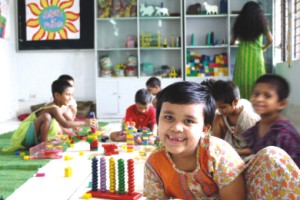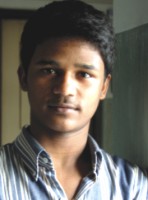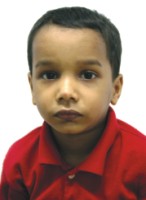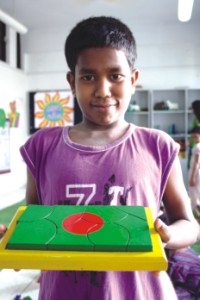Human Rights
Missing!
Hana Shams Ahmed
 |
Shumi woke up one day to find herself in a train with another man. |
Seven-year-old Shumon can't stop grinning and his eyes sparkle with curiosity as he greets us at his adopted home in BNWLA's (Bangladesh National Women Lawyer's Association) hostel in Agargaon. He's one of the many children who has had to face the cruel reality, a child's worst nightmare, of losing his parents and home and enter an unknown and unfamiliar world. According to BNWLA, in 2006 a total of 367 children went missing from their homes.
Whatever horror Shumon has had to go through in the past few years does not reflect on his face though. He looks genuinely excited about the arrival of people from outside the hostel. He enthusiastically shows us his jigsaw puzzle of the Bangladeshi flag. When I ask him if he has solved it all by himself, he takes apart the whole thing and redoes it to prove that he did indeed solve the puzzle himself. Shumon doesn't know his last name or the name of his village home; he only knows that somewhere in Netrokona a mother who goes by the name of Saleha is crying out for her lost son.
 |
Monir was abducted by two neighbours and sold off as a camel jockey in Dubai. |
But Shumon is defiant and does not want to show his vulnerabilities. “I don't think about my mom,” he says, “I like it here. I study and play here all day. When I grow up I will look for my mother.” I ask him if he would be able to recognise his mother after so many years but he doesn't seem to fetter. “I will recognise her,” he shrugs, “she looks like you and even if I don't find her I will just come back here.” And a mischievous smile comes back on his face.
Shumon vaguely remembers the fateful day. “One day my mom kicked me out of the house for being naughty,” he says, “I became really angry and got on the train and came to Kamalapur station.” He slept at the station that night and the police later found him roaming around and brought him over to the BNWLA hostel. That's one side of the story -- the straightforward one told by Shumon. But one can't help but wonder what Shumon's mother has had to go through and must still be going through for losing her temper that day.
Each and every person staying at the hostel has a tale to tell, a life that has deviated quite a bit from the conventional because of a certain incident, or a chain of incidents. But it has happened and they all know that they will never be able to go back to their former, relatively carefree life. The hostel is colourful and full of life, but life without family and loved ones is just not the same and waking up every morning in an unfamiliar setting is a gentle reminder of that bitter day that changed their lives forever.
 |
Sohrab lost his way from home two years ago. |
There's Monir, for example, the 17-year-old camel jockey who returned from Dubai a few months ago after spending 10 years of his precious childhood in a country that had nothing in common with his homeland. One day when he was studying in school he was lured out by two of his neighbours, promising to take him shopping. They never went to any shops. “We got onto a tempo and went to someone's house where we stayed for a few days,” says Monir, “I wanted to go home but they wouldn't let me. They told me that they would take me to Dubai and put me in a school.”
But no school was waiting for Monir in Dubai. What was waiting for him was a bunch of bored, rich Arab merchants who didn't know what to do with their money and paid a huge amount of cash to people who smuggled underweight children from poor families in the sub-continent. “I used to wake up very early in the morning when all the older people were sleeping and go to sleep at midnight,” says Monir, “I used to serve food at a hotel and ride (as a camel jockey) at the same time.”
Monir says that he remembers what his parents look like but has no clue about where in Bangladesh he used to live. He is slightly hesitant to talk about his life in Dubai, even a little suspicious perhaps of talking to a stranger. I suppose he also wonders what good it will do him by talking to me. No one came to ask him if he was well, or if he was comfortable when he was slaving day in and day of with his life at risk on top of a camel's back and with no prospect of ever seeing his homeland again. No reporter revealed his story when he was actually facing his darkest days, so why now? He does not seem very optimistic about finding his family again but adds, “I'm glad I could come back to Bangladesh. I really never thought I would see my homeland again.”
 |
Shumon says he will look for his mother when he grows up. |
Six-year-old Sohrab Babu has been living in the hostel for two years now. The counsellors there were at their tethers end in trying to communicate with him when he first came when he was only four years old. He wouldn't talk to anyone and would cry all day and night. Advertisements were placed on TV but there was no response. Sohrab was rescued from the Cantonment police station and the only address of his house he knew was that he lived in Nawapara. Three known Nawaparas were visited but they were all fruitless. When I ask him his name he starts telling me his whole story in short phrases. “I am Sohrab Hossain. I have a grandmother. My dad died. I got lost. Then I came here.”
When I ask him if he likes it here he shakes his head and I ask him if he misses his mom. He nods his head and says, “I think about my mom a lot.”
While I am talking to Sohrab I notice a little girl in a white flowery frock giving me furtive looks. When I look at her, her face breaks into a smile, revealing a few missing front teeth. Her name is Shumi and she has been staying at the hostel for nine months now. She looked to be about four or five years old. There's something about her cherubic expression that forces a gulp down my throat. She looks quite healthy and her accent implies that she comes from a fairly educated family. So how did she end up here I ask. Her details are vague too. “I used to live in Dinajpur,” she says, “and we can go there by train.”
She goes into details about her family. She had a cousin brother at her house she says. She lived with her mother in their house and her father was dead. “My dad died when I was in my mom's tummy and my mom and my nani brought me up,” she says, “I don't have any brothers or sisters.” But when I ask her about her mother her expression changes. The smile disappears and she lowers her eyes. “I think about my mother all the time. She used to love me a lot,” says Shumi, “she was my own mother.”
I press on about how she got lost from her family. “I was sleeping one day,” she does not specify where, “ and when I woke up I saw that I was in a train.” Shumi says that a bhaiya (brother) was sitting beside her inside the train and when she asked him where he was taking her, he didn't respond. She stayed at someone's house. “One day they just left me on the streets,” says Shumi, “and I started to cry and then fell asleep on the roadside.” Someone later found her and brought her to the police station.
Because children who go missing are so young they are usually unable to say their address or even their own names properly. That makes it very difficult for social workers to trace their homes. And because most of the parents are not educated, they don't register the names of their missing children at the police station. Advocate Salma Ali, the Executive Director of BNWLA, states that it is indeed a very challenging issue. “Although it does not really fall in the criteria of what we are supposed to do (giving legal aid to abused women), we feel obligated to help these children out on humanitarian grounds.”
“We don't really want to send them to the orphanages either,” says Ali, “because although I haven't visited there, we aren't really confident about the way the children are kept there.” Ali feels that these orphanages don't maintain the minimum standard of care and support children need. “I don't want to criticise them but I think they should have some basic support service like a child's right to speak out, get cared for and right to education. It's no use sending kids to places where these needs are not catered for.”
“We do encourage adoption,” continues Ali, “we give custody to parents without kids after we check their references and where they live but most people want very young babies and not the older children.” Another couple apparently came to BNWLA and said that they wanted a child who they said would look after like their own but she would also 'help' around the house. “So we had to stop the adoption process right there.”
Some children have also been adopted by people working in BNWLA. “We found a boy on the street completely malnourished and he was adopted by someone here,” says Ali, “and now he's going to appear for his O level exams from an English medium school, although he has an eye problem as a result of malnourishment from earlier.” Ali talks about another not so inspiring story where a girl was adopted by a very educated woman from a well-off family living in Dhanmondi. She was put in an English medium school and studied there till class nine. Her adopted mother could not deal with her in an incident between her and a young boy and there was a big fight after which they put her in a youth correction centre. “We counselled them a lot but the mother eventually refused to take her back,” says Ali, “her brothers too refused because they didn't want to share their property with the adopted sister.”
Ali says that one of the main places from where children get lost is from the many slums all over Dhaka. “Small children living here are left alone by their mothers when they go to work, and sometimes they get lost or kidnapped from there,” says Ali, “they are also victims of abuse a lot of times.
Ali is disturbed by the attitude of the people in this country towards adoption. “They still don't have the mind-set to accept an adopted child like their own,” she says, “they still discriminate their biological child with the adopted child.” She says that the acceptance has to come from within and there has to be support from the families and relatives involved.
Photographs: Zahedul I Khan
Copyright
(R) thedailystar.net 2007
|
